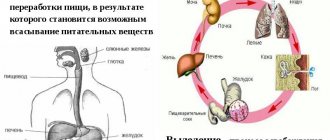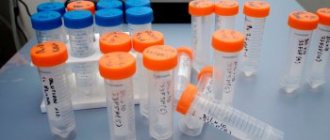In the early stages of pregnancy, women experience a feeling of bloating. Why is this happening? Increased gas formation during fetal formation is explained by physiological characteristics and hormonal imbalances. To cope with the discomfort that comes with this condition, mothers need to dress, eat properly, stay physically fit, and protect themselves from nervous shock.
Why does flatulence occur?
Bloating in the early stages is more common.
This is due to the fact that a large amount of progesterone begins to be produced in the body of a pregnant woman. As a result, the gastrointestinal tract organs contract less, the digestion process slows down, and stagnation appears, which leads to bloating.
In addition to progesterone, flatulence during pregnancy can be caused by:
- deficiency of enzymes necessary for digesting food;
- changes in diet: during pregnancy, women's taste preferences change, bloating is the body's natural response to changes in diet;
- stress;
- exacerbation of chronic gastrointestinal diseases;
- dysbacteriosis;
- high physical and mental overload;
- poor nutrition, excess carbohydrates and roughage, a lot of fatty foods, smoked foods;
- deficiency of vitamins, microelements, nutrients;
- low fluid intake;
- tight clothing pressing on the stomach;
- infectious diseases;
- bloating in the second trimester causes displacement and pressure of the growing uterus on the internal organs: intestines, stomach;
- parasitic infections;
- bad ecology.
Why may there be increased gas formation in the early stages?
After conception, hormonal levels become unstable - this contributes to the frequent appearance of gases. In order for the fetus to develop normally, the body produces a lot of progesterone. It helps reduce tension in the uterine muscles, reducing the likelihood of miscarriage. In this case, the effect of the hormone extends not only to the uterine muscles, but also to the muscular system of the entire body.
Weakening muscles contributes to increased gas production as early as 5 weeks of pregnancy. Despite the fact that flatulence is not a pathology and occurs in all expectant mothers, it is necessary to take measures to eliminate this phenomenon. If the problem is left unattended, a woman may experience complications when carrying a baby and when it is born.
Increased gas formation can be provoked not only by hormonal changes, but also by a woman’s chronic pathologies, which worsen after fertilization. Diseases of internal organs such as gastric and duodenal ulcers, cholecystitis, dysbiosis, pancreatitis, colitis can cause improper functioning of the gastrointestinal tract.
When semi-digested food reaches the intestines, the fermentation process begins, during which a lot of gases are released. They make the stomach swell and cause a feeling of discomfort.
Bloating in early pregnancy can occur due to lactase deficiency. If it is accompanied by diarrhea, vomiting, rumbling in the intestines, or loss of appetite, the woman should be tested for lactase deficiency. Increased gas formation is also caused by iron-containing medications, which are prescribed to expectant mothers in the first trimester.
INTERESTING: can pregnant women take Espumisan in the first trimester?
Causes of bloating and pain in the intestines
Many women in the first trimester of pregnancy begin to feel unpleasant symptoms, the most painful of which is considered bloating. This condition is very difficult to avoid, because flatulence in the absence of menstruation in most cases indicates the birth of a new life in the mother’s body.
Abdominal bloating during pregnancy is accompanied by characteristic symptoms, manifested in the form of:
- feeling of fullness;
- bitter taste on the tongue;
- poor appetite;
- significant increase in heart rate;
- heartburn;
- stool retention;
- nausea;
- general weakness;
- pain in the heart area;
- increased pressure;
- rumbling sounds;
- frequent passage of gas, accompanied by tingling;
- cramping pain, as during menstruation;
- belching with smell.
In the second and third trimester, pregnant women's bellies swell and gases do not pass due to the fact that the uterus grows rapidly during this period and begins to put pressure on other organs. This contributes to the retention of feces in the intestines.
If in the later stages a pregnant woman has a bloated and hard belly, it is necessary to identify and eliminate the causes of flatulence. It promotes increased tension in the smooth muscles of the uterus, which can lead to the birth of a baby ahead of schedule.
Gas during pregnancy may be accompanied by sharp pain in the abdominal area that appears after eating. This condition may be associated with the inclusion of new foods in the diet, which make the stomach swell. Digestive disorders cause constipation in many people, which further complicates the situation.
If the stomach hurts a lot and is bloated, the woman needs to undergo a medical examination. Such symptoms may indicate not only flatulence, but also helminthic infestation, vascular diseases, intestinal obstruction and inflammation of the mucous membranes.
Stress and anxiety can increase the process of gas formation in pregnant women. To reduce painful symptoms of bloating, expectant mothers should avoid exciting situations, maintain physical activity, wear loose-fitting clothes made from natural materials, and eat foods rich in iron.
Signs of increased gas formation begin to appear in the first weeks after conception, which indicates that changes have begun in the woman’s body. It's time to think about the quality of nutrition so that flatulence does not turn into a pathological condition - constipation with intoxication. The symptoms must be dealt with - for this there are all kinds of medications, as well as traditional medicine.
The first reason why problems begin in the intestines of pregnant women is a high level of the hormone progesterone. Its excess amount is produced by the body to prevent miscarriage. The reverse side of the process is atony. The peripheral nervous system connects the uterus and intestines, so acceleration of peristalsis can cause uterine tone, miscarriage or premature birth.
Nature protects one organ at the expense of another. The functioning of the digestive tract can be easily corrected with the help of diet, water regime, and consumption of foods that promote the evacuation of feces. The woman’s goal is to monitor the functioning of the gastrointestinal tract and take timely steps to alleviate her condition.
The second reason is the consumption of foods that are difficult to digest in the digestive tract. As a result, gases are formed:
- hydrogen;
- methane;
- hydrogen sulfide;
- ammonia;
- carbon dioxide.
The small intestine contains bacteria that break down plant foods. This releases carbon dioxide. Hydrogen is the end product of the breakdown of carbohydrates. A large amount of it is released when eating beans, peas, other legumes, and cabbage.
Methane gas is formed in small quantities and only during the digestion of those substances that the body itself created - these are liver enzymes, digestive juices of the pancreas and gall bladder. Scientists have not determined exactly why methane is produced in the body, most likely it is due to intestinal flora - certain types of microorganisms involved in digestion.
Intestinal gases have an unpleasant odor because they contain impurities of sulfur-containing substances found in food products.
First trimester
The causes of bloating and gas formation in early pregnancy are:
- Dehydration, which often goes unnoticed due to the habit of drinking juices, tea, compote or carbonated drinks with a high sugar content instead of water.
- Wearing tight clothes.
- Diseases of the vessels that deliver blood to the intestinal walls.
- Parasitic infections. In the initial stages, a woman’s immunity naturally decreases, so all pathogenic life forms in the body begin to multiply intensively.
- If a woman has undergone abdominal surgery in the past, adhesions may form, which will create big problems in the later stages. In the presence of adhesions, the mobility of internal organs is impaired, and the growing fetus will create tension and tears in the fibrinous tissue, which causes constant pain.
Second trimester
In the second trimester, the fetus actively grows, which causes displacement of the abdominal organs. For this reason, frequent belching, heartburn occurs, even if it has never happened before, and constipation.
Many women are prescribed iron supplements to increase their red blood cell count. Such drugs increase constipation and provoke gas formation. If a doctor recommends eating meat (beef) to eliminate anemia, this also affects peristalsis and the state of intestinal flora.
The stomach often swells in the second trimester of pregnancy due to wearing tight clothes and shoes.
Bad eating and lifestyle habits contribute to the rooting of the problem, so deciding what is more important is urgent.
Third trimester
During this period, the condition of the intestines is affected by a sedentary lifestyle. It is harder for a woman to move, so she prefers to lie down.
The third trimester has the highest rates of constipation and bloating. Heartburn is often observed due to the uncomfortable position of the stomach, on which the fetus presses.
Treatment without drugs
If you experience increased bloating during pregnancy, you should immediately seek help from a physician and gastroenterologist.
As a result of the examination, it is possible to establish the root cause of this condition and prescribe effective treatment. The main thing is to determine why this phenomenon occurs.
Pregnancy is a serious period during which it is not recommended to take certain medications
. If flatulence occurs due to poor nutrition or physiological processes, then the situation can be corrected by adjusting the diet and reducing exercise.
Interesting! What pregnant women should not eat: list of prohibited foods
As for nutrition, you should adhere to simple rules.
What to do during pregnancy:
- food should be consumed in small portions;
- after a meal you need to lie down for a while;
- food must be chewed well and for a long time;
- It is not recommended to eat on the go;
- It is strictly forbidden
to eat fast food.
Diet planning is also important. Particular attention should be paid to products that cause gas formation. They need to be excluded
from the diet. This primarily applies to the following products:
- Bell pepper;
- radish;
- mushrooms;
- eggplant;
- cabbage;
- legumes;
- fruits;
- sparkling water;
- fatty meat and others.
These products cannot be consumed in any form
. The method of preparation does not matter here.
Eliminating bloating is a complex undertaking.
Correcting your diet will not be enough here.
In addition, you should pay attention to what you can and should do during pregnancy:
- Walk outside. Expectant mothers should spend as much time as possible outdoors. It's good for their health. Walking allows you to get rid of bad mood and stress.
- Gymnastics. Today, a whole range of procedures has been developed that allow you to improve the functioning of the body’s systems. This also applies to the gastrointestinal tract.
- Abdominal massage is useful for ailments and unpleasant sensations. Movements should be smooth and gentle, directed clockwise.
- Warm heating pad. For bloating or pain, a warm heating pad
or a heated bag of herbs will be an effective remedy. The product should be applied to the abdominal area. After half an hour, the symptoms will begin to subside. - Rules for choosing clothes. Expectant mothers are not recommended to wear tight or tight
clothing. She puts pressure on her stomach. This also applies to thick jeans. The best option would be loose dresses. - Folk remedies. To eliminate discomfort and such symptoms, various herbal decoctions are used. Ginger tea is an effective remedy.
Flatulence is a fairly common problem among pregnant women in the early stages. It is better to fight the disease first with conservative methods. But, if all else fails, you will have to use drug therapy.
Manifestations of flatulence
The disease is characterized by the following manifestations:
- abundant gas formation, active release of gases;
- bothered by a constant feeling of heaviness in the stomach;
- loss of appetite;
- the stomach is swollen, bursting;
- your stomach is rumbling, you can hear gas bubbles bursting, food is overflowing;
- nauseated at any time of the day;
- problems arise with stool: constipation or diarrhea appear;
- cramping pain in the abdominal area;
- belching, bad breath.
Poor digestion leads to a woman’s well-being deteriorating. Poor appetite leads to loss of strength and weakness.
The pregnant woman begins to worry and worry about her condition. The result is changes in blood pressure, fatigue, dizziness, and heart rhythm disturbances.
At what stage does bloating occur during pregnancy?
Flatulence can occur at any stage of pregnancy. Women who were familiar with digestive tract disorders before conception have the greatest chance of encountering this pathology. It is no secret that during pregnancy chronic processes flare up in the body with renewed vigor and all weak points are revealed. If there was previously a violation of the digestive processes, then after conception, bloating and constipation will not keep you waiting.
But healthy women don’t need to relax either. Many doctors are confident that abdominal problems in the 2nd and 3rd trimesters occur even in healthy expectant mothers due to increased pressure from the uterus on the organs of the gastrointestinal tract. That is, flatulence can occur regardless of the duration of pregnancy and the initial health of the expectant mother.
The main symptoms of flatulence are:
- Feeling of fullness and heaviness, sounds of transfusion and rumbling in the stomach.
- Frequent and profuse passage of gas.
- Nausea during the day, not associated with toxicosis.
- Loss of appetite.
- Stool disorders - constipation, diarrhea.
- Frequent belching, bad breath.
- Headaches, dizziness, drowsiness, tachycardia, surges in blood pressure, disturbances in general well-being - all this may be associated with the expectant mother’s worries about her condition.
Warning signs
Gas formation can cause weakness, migraines, and nausea, as decay products are absorbed into the blood and distributed throughout the body. In some cases they may be dangerous.
- Gases do not pass away. You feel severe bloating and pain in the abdomen. This can cause uterine tone and premature labor.
- Constant poor health and lack of appetite affects general tone, as fewer nutrients and vitamins are supplied.
- If your blood pressure fluctuates and signs of toxicosis appear in the later stages, you should consult a doctor.
- Acute abdominal pain with loss of appetite and vomiting requires urgent delivery of the woman to the hospital.
Uterine tone and bloating: ways to distinguish the conditions
Intestinal spasms can be mistaken for uterine tone. But there are distinctive features by which flatulence is determined:
- distension in the abdomen, accompanied by rumbling;
- heaviness in the stomach;
- gradual release of gases;
- combination with constipation (rarely with diarrhea);
- nausea;
- loss of appetite;
- belching.
Abdominal pain due to impaired gas discharge can be very severe, reminiscent of periods of spasm and relaxation. It is not difficult to distinguish this condition from uterine tone.
If there is a threat of miscarriage, the uterus becomes rocky. During flatulence, she does not tense up. But if bloody or liquid discharge appears from the genital tract, you should immediately consult a doctor.
MORE ABOUT: Innovations in the treatment of throat cancer
Dangerous symptoms that require medical attention are:
- temperature increase;
- diarrhea for several days;
- signs of dehydration;
- stool with blood and mucus.
This indicates a possible acute intestinal infection, which requires serious treatment.
When to see a doctor
Increased gas production during pregnancy is normal. However, this symptom should not be ignored, as it may indicate other diseases.
There are a number of symptoms that require immediate medical attention:
- severe diarrhea;
- nausea and vomiting;
- acute pain in the abdomen;
- dehydration of the body;
- complete lack of appetite;
- high temperature, fever;
- blood and mucus in the stool;
- long absence of trips to the toilet in large quantities (for 2-3 days or more).
A pregnant woman should be careful about her health. Deterioration in well-being, bad mood and weakness are not the only consequences of bloating.
What to do
It is important to notify your doctor if you have flatulence, frequent belching, or flatus (voluntary or involuntary release of gases from the intestines).
Tolerating discomfort or ignoring the problem, trying to wait it out without taking adequate measures can play a bad joke on the body and health.
Although in most cases increased gas formation in the gastrointestinal tract does not lead to serious consequences, a number of dangerous diagnoses should be excluded, and the nature of the process should be determined.
Gas formation during pregnancy can be a signal of the presence of several serious diseases, such as: dysbiosis, acute intestinal infections, the presence of intestinal parasites, pancreatitis, enteritis, colitis, etc.
If, according to the results of the examination, it turns out that flatulence appeared due to serious disorders or diseases, then immediate treatment will be required.
In other cases, when gas formation is a consequence of an unbalanced diet, changes in hormonal levels or pressure from the uterus, a number of simple actions can be taken that can significantly improve the well-being of the pregnant woman.
Diagnostics
If diet, physical activity, and proper sleep do not help, and flatulence continues to bother the woman more and more often, it is advisable to undergo a full examination. This will make it possible to establish the true causes of bloating and poor health.
At the hospital, the woman will be asked to undergo blood, urine and stool tests. Ultrasound examinations in the second and third trimester allow us to assess the position of the fetus and its impact on surrounding organs.
Aggressive intestinal behavior in the first trimester can cause dehydration and increase toxic effects on the fetus. A woman's lack of appetite in the first three months is dangerous for the formation of the baby's tissues. Due to poor digestion, the baby may be born weak and sickly.
Ways to normalize bowel function
Treatment and prevention of flatulence are based on changing the nature of nutrition. Avoid foods that can increase gas formation from your diet:
- legumes - peas, beans, lentils, soybeans;
- dairy products - fresh milk, kefir, yogurt;
- vegetables - radishes, cabbage, eggplant, peppers and mushrooms;
- fruits - grapes, apples, plums, peaches, apricots;
- drinks - all carbonated, kvass;
- flour - yeast bread and any pastries;
- sweets - chocolate, sweets, confectionery.
Also limit or exclude corn, peanuts, fatty meat products and smoked foods.
Useful for preventing gas formation:
- rice;
- lean meat and fish;
- whole wheat bread;
- eggs in the form of an omelet;
- compotes;
- green tea;
- carrot;
- beet;
- dill, parsley.
It is also necessary to ensure adequate fluid intake throughout the day.
Lifestyle
The state of the intestines can be affected by physical activity. Therefore, it is necessary to take a walk after eating and before going to bed. And also do exercises for pregnant women. They will help maintain muscle tone and prevent the development of flatulence.
A daily routine and scheduled meals are needed to establish smooth functioning of the digestive tract and the production of enzymes. A full night's sleep is absolutely necessary - at least eight to nine hours.
Even in the early stages, clothing should be quite spacious and not compress the waist, pelvis or abdomen. It doesn’t have to be robes, but things should be soft, with stretchable belts in trousers and skirts, and inserts in the abdominal area.
If prescribed by a doctor, you can use medications to eliminate flatulence that will facilitate the passage of gases. It is not recommended to choose a medicine on your own: many of them are contraindicated during gestation. The permitted ones include the following.
- "Espumizan". The active ingredient is simethicone. It promotes the dissolution of gas bubbles and their natural removal. The drug is not absorbed from the intestines, therefore it is completely safe for expectant mothers. It also does not affect digestive tract enzymes and intestinal microflora. To get rid of flatulence, Espumisan is taken two capsules three to five times a day. The duration of treatment is not limited. There is no such thing as an overdose.
- "Disflatil." The active substance is also simethicone. But the drug is available in the form of drops, which makes it easier to take. They are used undiluted. 20-25 drops up to four times a day are enough. Side effects rarely appear in the form of an allergic reaction to additional components of the drug.
- "Zeolate". The active ingredient is dimethicone. The drug works as an antifoam. When consumed internally, it helps reduce gas formation. Available in the form of chewable tablets. It has no adverse reactions or contraindications.
- "Almakon". The drug acts as an antacid and carminative. Can be used during pregnancy when flatulence is combined with gastritis, esophagitis, heartburn. Take between meals. The course of treatment should not last more than two weeks.
The drugs that the instructions prohibit taking during gestation are the following:
- "Iberogast";
- "Meteospasmil";
- "Maisigel";
- "Maalox Plus".
To gently eliminate flatulence, you can use fennel tea, which is sold in pharmacies in the form of soluble granules or filter bags. It is taken at night and during the day.
Traditional medicine methods are effective. But before using them, you should consult your doctor: not all medicinal herbs are safe for pregnant women. Traditional methods have another drawback. The effect of using herbs develops gradually. Therefore, if the feeling of pain and distension in the abdomen becomes unbearable, it is better to resort to pharmaceutical remedies that will help much faster.
At the first sign of intestinal problems, action must be taken. You should not immediately grab pills and medicines, but your doctor should be warned. The first therapy is non-drug.
First of all, you need to review your diet and diet. You need to switch to fractional meals: reduce portion sizes and increase the frequency of meals. Each piece must be chewed thoroughly, and do not grab food in large pieces. The optimal position for eating is reclining.
Foods that cause gas formation should be excluded from the diet. This group includes coarse vegetables:
- radish,
- radish,
- raw cabbage,
- legumes,
- corn,
- pepper,
- eggplants.
Some fruits and berries aggravate the situation:
- apples,
- plums,
- peaches,
- apricots,
- grape.
Mushrooms and peanuts cause your stomach to swell. It is undesirable to eat all these products in any form: boiled, dried, salted. They always provoke increased gas formation.
Fatty foods and smoked foods create extra stress on the digestive organs, so they should also be avoided.
There are a number of products that reduce gas formation, promote the collapse of air bubbles and their exit from the body.
These need to be added to your diet:
- Fresh herbs have a good effect: dill, parsley, cilantro. Adding them to salads is a must;
- lean meat, fish, poultry;
- all seafood has a good effect on digestion;
- cereals and porridges: rice, oatmeal without milk, crumbly buckwheat;
- whole wheat bread;
- boiled, carrots, beets;
- green tea.
To normalize intestinal function and eliminate gases during pregnancy, it is necessary to put your daily routine in order, as well as provide the body with sufficient physical activity.
For example, when walking, the abdominal muscles contract and massage the intestines, normalizing its peristalsis. A sedentary lifestyle, even in healthy people, causes stagnation in the body. During pregnancy, the risks increase.
Remembering about rest, you must not forget about sufficient physical activity. Excessive activity is fraught with negative consequences, but feasible exercise has a beneficial effect.
For expectant mothers, walks in the fresh air, special gymnastics, swimming and water aerobics are useful. It is advisable to do breathing exercises. In this case, you should choose clothes that are comfortable, do not restrict movement and do not compress the stomach.
Pauses after eating are useful, during which the expectant mother will massage the abdomen. Movements should be smooth, stroking, without sudden pressure. The hand moves in a circle clockwise.
How to get rid of the feeling of fullness?
Treatment of flatulence during pregnancy should be carried out with drugs that do not pose a threat to the health of the mother and baby. You can also get rid of bloating during this period using alternative medicine methods. To eliminate discomfort and pain, the expectant mother needs to lead a healthy lifestyle, monitor her daily diet and the amount of fluid she drinks, and also maintain physical fitness.
Drug therapy
At the beginning of pregnancy, women often experience an unpleasant feeling of bloating, in which the stomach becomes round and bursts with gas. Symptoms that appear can be eliminated with the help of medications, the use of which is not contraindicated for expectant mothers. How to carry out treatment and what medications are best to take should be decided by the attending physician; you should not do it yourself.
Carminatives are highly effective against flatulence. After taking it, the woman’s intestines relax and spasms go away. The safest drug in this category is Simethicone. It is used to treat increased gas formation in pregnant women and infants.
Espumisan is often prescribed by gynecologists to eliminate symptoms of flatulence in expectant mothers. This inexpensive drug is harmless, as it is not absorbed into the blood and does not affect the development of the embryo. A quick therapeutic effect is achieved due to the fact that the substances included in the medicine form a protective film on the inner walls of the intestine.
The natural homeopathic remedy Iberogast contains plant extracts of the following medicinal plants:
- licorice;
- peppermint;
- chamomile (for more details, see the article: the benefits of chamomile during pregnancy);
- caraway fruit;
- bitter Iberian;
- milk thistle;
- angelica officinalis.
The popularity of this remedy among pregnant women is explained by the fact that it has a selective effect on the intestines - it improves muscle tone where it is needed and relaxes areas with strong tension. The drug also helps with constipation and irritable bowel syndrome.
READ ALSO: constipation during pregnancy: what to do at home?
Traditional treatment
In alternative medicine, there are many methods for eliminating the symptoms of gas formation that bring discomfort to a pregnant woman. This task is best accomplished with infusions of medicinal plants such as coriander, parsley, St. John's wort, and dried herbs. To achieve a therapeutic effect, they should be consumed before meals no more than three times a day.
You can eliminate flatulence in pregnant women with dill water. This is a natural remedy that is fennel oil diluted to the desired concentration. Dill water is also used to relieve intestinal colic in infants.
If in the initial months of pregnancy a woman feels that her stomach is swollen, herbal teas made from pharmaceutical chamomile or lemon balm can help her. The prepared tea should not be over-brewed.
You can remove formed gases from the intestines at home using cleansing enemas. Just a few procedures can relieve the expectant mother of discomfort and painful symptoms.
Nutrition and drinking regime
To avoid severe bloating when carrying a baby, the mother needs to pay special attention to her diet. It is necessary to exclude dishes prepared from products that enhance the fermentation process in the intestines. The consumption of yeast baked goods, vegetables, cabbage, apples, sweets, coffee, full-fat milk and cottage cheese should be minimal.
The menu during pregnancy should be dominated by porridge, dishes made from lean meats and fish, rich in protein. To normalize the functioning of the gastrointestinal tract, it is necessary to include in the diet such fermented milk products as kefir, fermented baked milk, snowball, and yogurt. Pumpkin, prunes, and bananas contain many useful substances that a baby needs.
To avoid bloating, constipation and other digestive problems, you need to follow a drinking regime that corresponds to the physiological characteristics of the expectant mother’s body. The daily amount of water that a woman should drink is one and a half to two liters. This amount should be consumed in small doses throughout the day; you should not drink more than 60 - 80 ml at a time.
Physical activity and massage
In some cases, digestive problems in women during pregnancy occur due to insufficient physical activity. To speed up the process of emptying the intestines of feces and gases formed in them, the expectant mother should increase physical activity. The best option in this case is long walks.
If the pregnancy proceeds without complications, the mother can do special gymnastics, swimming and yoga to maintain physical fitness. To avoid harm to health, classes should be conducted with an experienced instructor.
Abdominal massage also helps digest food. Intestinal motility improves if you perform the procedure with soft stroking movements, first clockwise, and then in the opposite direction.
Therapy methods
First, you should put your diet in order: give up carbonated drinks, coffee, dark chocolate. Divide the daily amount of food into 5-6 meals. To reduce fermentation, you should not drink food you have just eaten. You should wait 30–40 minutes and then drink water or herbal tea.
The following products can provoke gas formation:
- all legumes;
- turnips, radishes;
- onion garlic;
- cabbage of all varieties;
- alcohol;
- flour products, especially white flour;
- smoked meats, marinades with vinegar;
- sweets from the store;
- bananas, apples, sour berries.
Pregnant women are not recommended to frequently take activated charcoal, since, together with harmful components, it adsorbs beneficial nutrients, leaving the woman and fetus without minerals and vitamins.
If you have heartburn, it is not recommended to drink soda. When alkali and acid come into contact, a large amount of gas is released, which worsens the woman’s already poor health.
To eliminate flatulence, doctors recommend:
- Smecta. The powder is diluted in water and drunk. This is a natural drug that is safely used in pediatrics. You need to drink for up to 7 days, then take a break.
- Exportal. Use with caution, taking into account the degree of risk, since the components of the drug are not natural. Officially approved medicine for pregnant women.
- Microlax. An enema that can be used by children from birth and pregnant women for constipation that causes bloating.
- Probiotics – acidophilus, hilak forte.
Various herbal tablets should be used with caution so as not to irritate the intestinal wall or cause inflammation.
Any means must be approved by the supervising physician.
Commonly used traditional medicine methods:
- dill, fennel, mint, chamomile;
- vegetable broths;
- ginger.
Homemade dairy products are useful - kefir, fermented baked milk, yogurt. Fat cottage cheese and store-bought milk should not be consumed.
Methods for treating flatulence during pregnancy
A woman’s position imposes restrictions on the choice of methods for treating bloating during pregnancy. It is necessary to select products that are completely safe for the expectant mother and baby.
You can relieve symptoms with the help of medications and folk remedies. In any case, you need to consult a doctor. The specialist will help you choose a treatment method and, if necessary, prescribe additional examinations so as not to miss the possible onset of a gastrointestinal tract disease.
Traditional methods are very popular. For example, dill water is completely harmless to the female body, but it has a strong carminative effect. The preparation is simple: 1 tbsp. l. dill seeds pour 2 tbsp. boiling water and cool. The infusion is ready. They drink it 0.5 tbsp. before eating.
You can use an infusion of coriander seeds. 1 tbsp. l. pound and pour a glass of boiling water. Take ½ tbsp. before eating.
Prevention measures
How to eliminate bloating during pregnancy using preventative measures?
You need to follow these recommendations:
- Do not wear clothes that restrict your stomach.
- Avoid a sedentary lifestyle. Even a daily walk helps improve intestinal motility.
- Eat small meals, excluding overeating.
- Do not drink water or other drinks while eating.
- Don't talk while eating.
Many women faced with the problem of flatulence during pregnancy urge other expectant mothers to come to terms with this situation and take it for granted. But you don't need to do this. Increased gas formation can and should be combated, at least with the help of nutritional correction and lifestyle changes. If flatulence causes serious discomfort and interferes with a full life, it is important to consult a doctor to receive appropriate recommendations and exclude possible pathologies from the internal organs.
Author: Olga Rogozhkina, doctor, especially for Mama66.ru
Possible complications and consequences
If you do not take care of the condition of the intestines and do not fight constipation during pregnancy, you can get chronic gastrointestinal diseases and fecal stones, which are very difficult to get rid of, especially if you are not aware of their existence.
In early pregnancy, increased peristalsis provokes uterine tone, which threatens miscarriage.
The most serious complication that can lead to the death of a woman and fetus is peritonitis, which occurs against the background of chronic diseases of the stomach and pancreas, as well as rupture of the wall of the cecum, resulting in pus pouring into the abdominal cavity. Symptoms of peritonitis include vomiting, cold sweat, severe weakness, loss of consciousness, bloating, diarrhea, or constipation.
Measures to normalize bowel function
If a woman does not have her period and has bloating, this indicates that the baby is developing inside. From now on, she must be especially attentive to her body, since now she is responsible not only for her life.
It is very difficult to avoid bloating in the first months, but you can reduce the discomfort and discomfort. To prevent gas formation, you should eat small meals every 2-3 hours. Chewing food thoroughly reduces the likelihood of stagnation in the intestines, and, consequently, bloating.
If, during a meal, a large amount of air enters the digestive tract along with food, it subsequently accumulates in the intestines. To avoid this, mommy should not talk while she eats. Products that contain lactic acid bacteria are best consumed in the evening.
To prevent gas formation during pregnancy, it is necessary to follow the rules of personal hygiene: washing hands after visiting public places, wearing a gauze bandage if there is a flu epidemic in the city.
In the summer, you should not buy meat and seafood in unfamiliar places, so as not to get an infection. You cannot swim in bodies of water where the water does not change - quarries, ponds. Even the fish in them are infected with worms.
It is necessary to establish nutrition, since after childbirth you will have to maintain a diet for a long time while the baby feeds on breast milk. After all, he may have the same problems that worried his mother during pregnancy.
Lifestyle
Gases in the second half of pregnancy
In the second trimester, women also begin to worry about the problem of gas formation. These unpleasant sensations are accompanied by bloating, belching and rumbling.
All this provokes these unpleasant processes in the intestines. And don’t forget that mothers eat everything and don’t watch their diet, this plays a big role on the body.
But if it is not related to nutrition, then these symptoms will not bother you so much, but they will not disappear completely. But most likely it is related to nutrition.
In order to eliminate gases with the help of a diet, you should not worry about this, since the diet will practically not change, it will only be slightly balanced and will become more useful.
The child should receive the required amount of healthy foods, and the same applies to the mother. It is important to carefully sort out the products and remove those that contribute to the gas exchange process.
These products include beans, various cereals, grapes, corn and cabbage. The formation of gases can be eliminated by a product such as cottage cheese; it is very useful during pregnancy.
Ryazhenka and kefir will also benefit your intestines. There are other ways to combat gases in the intestines, these are daily walks in the open air, swimming in the pool and special gymnastics for the stomach, it consists of stroking the tummy in different ways.
At 39 weeks of a normal pregnancy, intestinal problems should be taken seriously. Gases during this period contribute to uterine hypertonicity, and this, in turn, leads to premature birth.
This is why it is so important to listen to the state of your body. During the development of the second trimester, the uterus increases significantly. It begins to put pressure on the digestive system.
And this is reflected in the manifestation of the following symptoms:
- heartburn;
- constipation;
- food retention.
Gases need to be monitored in late pregnancy. If in your case this condition is characterized by persistence, then additional research is important.
As a result of competent actions, the child is born healthy. To make it convenient for mom to care for him, it would be nice to purchase a “Light” carrying backpack.
Its main feature is to provide comfort to the child - thanks to its special cut, the device ensures comfortable and correct posture for the baby.
The load is distributed across all parts - hips, back and butt. The child can be placed in two positions - front and back. For mothers, such a backpack becomes a real salvation - you don’t feel the weight of the child, your hands are free. The baby feels comfortable and safe.
Predisposing factors
Not all women suffer from intestinal problems and bloating, but the processes that contribute to excess gas formation are triggered in the same way. The leading factor is the increase in progesterone concentration. This hormone is necessary to maintain gestation. It reduces the tone of the smooth muscles of the uterus, but its effect also extends to other internal organs.
In the gastrointestinal tract, under the influence of progesterone, motility decreases and the movement of the food bolus slows down. Therefore, the likelihood of fermentation and gas formation increases. Sometimes this is combined with constipation, when due to slow peristalsis, water absorption increases.
In the later stages, an enlarged uterus predisposes to bloating, which compresses the intestinal loops and impairs the forward movement of feces.
Medical assistance
When dealing with bloating, doctors are always guided by the woman’s position, so the medications used are those that will not harm either the mother or the child.
During pregnancy can be used:
- "Espumizan". The product destroys gases in the intestines and improves the condition. Use 2 capsules at night.
- "Iberogast". A carminative based on herbal ingredients. You need to take 20 drops before meals 3 times a day.
- "Simethicone". Treatment is carried out in a dosage of 25 drops after meals 3-4 times.
There are other drugs that can be used during pregnancy, but they should be prescribed exclusively by a doctor, indicating the exact dosage and rules of administration.
Additional influence
But the presence of predisposing factors is not enough. An additional influence is required, which will cause the accumulation of a large amount of gases.
- Nutrition. There are foods that, even under the most favorable conditions, increase gas formation. The reason is the chemical composition. The metabolism of some proteins results in gas. These products include legumes, cabbage, pickled vegetables, and black bread. Some people notice an increase in fermentation after eating large quantities of baked goods.
- Lack of enzymes. Congenital or acquired deficiency of pancreatic enzymes affects digestion. The culprit may be cholestasis, which often appears in pregnant women in the last stages. This leads to incomplete digestion of food and increased gas formation.
- Lack of water. Limiting the volume of fluid during the day can become a factor in the development of constipation. And it is often accompanied by flatulence.
- Dysbacteriosis. The intestinal microflora is involved in the digestion of food and the production of B vitamins. Beneficial bacteria populate the entire space and do not allow pathogenic ones to multiply. But with an imbalance and the predominance of opportunistic microorganisms, food digestion is disrupted and fermentation increases.
- Stress. Nervous tension affects peristalsis and digestion. Some women “eat” bad experiences and emotions. Errors in nutrition and the effect of stress hormones lead to flatulence.
- Constrictive clothing. A pregnant woman should reconsider her wardrobe. Skinny jeans and tight dresses should be left for later. Already in the early stages they will disrupt blood flow in the pelvis, and pressure on the abdomen will lead to disruption of the movement of intestinal contents.
Some of these factors can be influenced independently, without waiting for unpleasant symptoms to appear.











